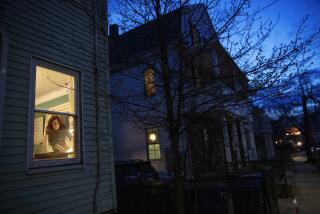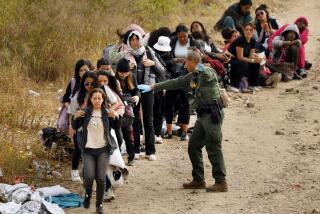CDC recommends looser Ebola monitoring than state quarantines for health workers
- Share via
The federal government announced new guidelines Monday for monitoring healthcare workers returning from West Africa that are far less restrictive than the quarantines that some states put in place for aid workers at risk of contracting Ebola.
The guidelines call for medical workers at high risk to isolate themselves and those at lower risk to regularly report their temperature to local health officials to see whether symptoms of the virus develop. They are merely suggested practices for state and local officials, who may quarantine as they see fit.
Dr. Thomas Frieden, director of the U.S. Centers for Disease Control and Prevention, emphasized that the new monitoring was based “on science,” an insistence the Obama administration has made repeatedly about its acts to stop the spread of the deadly virus. Federal officials have criticized the quarantines put in place in recent days in New York, New Jersey and Illinois, saying they would discourage aid workers from going to West Africa to help stop Ebola from further ravaging Guinea, Liberia and Sierra Leone.
“Managing Ebola is not easy, and what we’re doing with these new guidelines is using experience and data to refine the policies and programs we recommend,” Frieden said.
White House Press Secretary Josh Earnest said the administration hopes those state leaders will be persuaded by the expertise and medical research provided by federal agencies.
“What we hope,” said Earnest, is that their decisions will be “driven by science.”
In issuing Monday’s guidelines, CDC officials said that “high risk” travelers include those who have had a “needle stick” from an Ebola patient or are family members who have cared for an Ebola patient without protective gear.
Those people should stay off of airplanes, trains and buses, but can engage in public activities like going for a jog in a park, according to Frieden.
The new guidelines increase the level of protection for Americans, while at the same time protecting those who are doing “the heroic work of protecting us from Ebola as they fight it on the shores of Africa,” he said.
Earlier, New Jersey Gov. Chris Christie announced that a nurse who was quarantined in Newark after returning from treating Ebola-afflicted people in West Africa would be released and allowed to go home.
Christie’s move followed a barrage of criticism from civil rights groups, aid agencies and White House officials over the quarantine he announced Friday.
Nurse Kaci Hickox complained that she was put in an unheated tent on the grounds of Newark University Hospital after returning from Sierra Leone on Friday. She tested negative for Ebola, which has a 21-day incubation period.
In a statement Monday from New Jersey’s department of health, officials said Hickox “has thankfully been symptom free for the past 24 hours.”
“As a result, and after being evaluated in coordination with the CDC and the treating clinicians at University Hospital, the patient is being discharged,” the statement said. “After consulting with her, she has requested transport to Maine, and that transport will be arranged via a private carrier not via mass transit or commercial aircraft.”
“She will remain subject to New Jersey’s mandatory quarantine order while in New Jersey,” it said. “Health officials in Maine have been notified of her arrangements and will make a determination under their own laws on her treatment when she arrives.”
Christie’s decision followed New York Gov. Andrew Cuomo’s clarification of his state’s mandatory quarantine rules during a Sunday night news conference. Cuomo and Christie became the nation’s first two governors to declare mandatory 21-day quarantines for healthcare workers returning from the Ebola-stricken region and for others who have had contact with Ebola patients.
Illinois has since imposed similar quarantine rules.
The virus has killed more than 4,900 people in West Africa.
Liberia has been hardest hit by the disease, and Army Maj. Gen. Darryl A. Williams, commander of U.S. Army Africa, and 11 other soldiers returning from the Pentagon’s Ebola support mission in the country are being isolated and monitored for three weeks at a U.S. military installation at Vicenza, Italy.
Members of the team did not have direct contact with Ebola patients and are not reporting any symptoms related to the virus, but the Army decided to isolate them out of an “abundance of caution,” said Army Col. Steve Warren, a Pentagon spokesman.
The decision to isolate the soldiers does not mean all military personnel deployed to the region will also have to be monitored this closely, Warren said. The Pentagon is still examining what level of monitoring is necessary from returning soldiers, he said.
Staff writer W.J. Hennigan contributed to this report.
More to Read
Sign up for Essential California
The most important California stories and recommendations in your inbox every morning.
You may occasionally receive promotional content from the Los Angeles Times.












